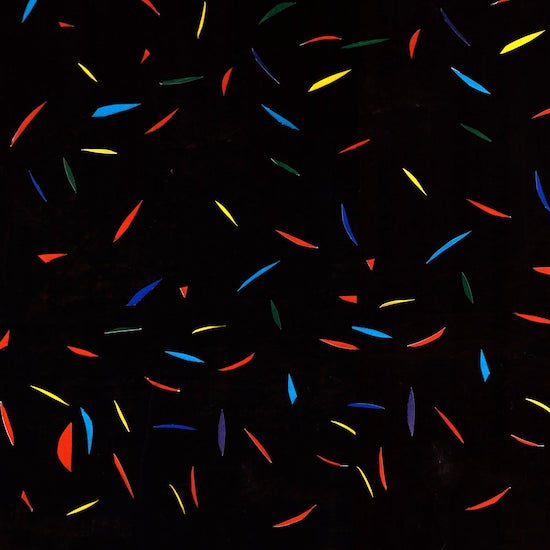When I first started taking notes for this review, it was the longest day of the year. Here, dawn began at 5:21 AM, dusk at 9:47 PM. As I write this, the days still linger on until nearly ten o’clock. Time feels stretched out, an excess that is, of course, illusory. Each day is elongated in a way that feels full of possibility, but also a bit frayed, like sunlight through a bolt of linen stretched taut. There’s an easy brightness about everything, even when overcast. How fitting, then, that Trash Kit have just released their third LP, Horizon, an album fully committed to that same sort of brightness, that seems to embody the drawn-out days into which it has emerged.
It’s been a while since we’ve last heard from the London trio, now composed of founding vocalists Rachel Aggs on guitar and Rachel Horwood on drums, with Gill Partington on bass. Back in 2014, their second album, Confidence, showcased a fearless, restlessly creative band. It’s a busy but fun and funky post-punk record, released into an era when people were all too willing to overlook just how flat-out entertaining the genre could be. For their follow-up, Trash Kit take Confidence and blow it up.
More than just about anything, for those familiar with the band, Horizon will come across as a kind of exploded view of everything that previously made Trash Kit sound like Trash Kit. Which is to say, all the constituent parts are more or less accounted for, just expanded, given room to breathe, arranged in such a way so as to fully elucidate how these new songs go together, how each part works. It’s always a bold move, laying everything so bare – if the tunes or execution aren’t there, what’s left?
Thankfully, both are on point. One of the first things listeners are sure to notice is how intensely the influence of 20th century African music – Aggs’s beloved Zimbabwean guitarwork in particular, though one could easily draw connections to, say, Nigerian, Ghanaian, or Ethiopian genres, among others – resonates throughout Horizon. Most of the tracks here play out in roughly the same way: a nimble, repeating guitar figure will dance around buoyant bass and joyous percussion as each composition unfurls, building to an ecstatic climax or, perhaps, a calm denouement. An extended coda isn’t out of the question. Nor is a sax freakout. Vocals are delivered in a shouted sort of sing-speak or call-and-response. The lyrics are minimal and direct, peppered with questions and exhortations: "Get out of bed!"
If that sounds repetitive on paper, it isn’t in practice. Trash Kit wring a surprising amount of variety from a relatively simple formula, pulling in outside collaborators like Serafina Steer, Emma Smith, and Coral Rose to accent their jams with harp, viola, and cello, respectively. And there’s that aforementioned saxophone: Dan Leavers of psychedelic jazz maniacs The Comet Is Coming dexterously skronks his way through five of the eleven tracks here. His contributions feel so essential and enmeshed into the very fabric of Horizon that surely he deserves honorary "fourth member" standing. Here’s hoping he got an engraved plaque or at least piece of cake.
Most importantly, as the band builds momentum on track after track, they never miss an opportunity to draw unexpected emotion from their grooves. Time and time again, they excel at finding and seizing every opportunity to fully capitalise on the underlying beauty of these compositions. Likewise, they never undervalue or underestimate the sheer power of gentleness.
This is a record that bursts with life. Horizon is a verdant late June day, green grass and green leaves buzzing and hissing with activity, before the hot mid-July sun burns everything golden. It sings to the seeming boundlessness of days like these – so limited in number, but so full of potential. It sings to us, urging us not to waste a precious second of daylight.



